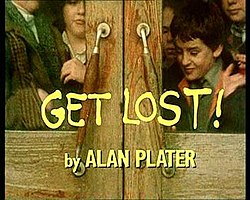| Get Lost! | |
|---|---|
 | |
| Genre | Comedy drama |
| Written by | Alan Plater |
| Directed by | Lawrence Gordon Clark |
| Starring | Alun Armstrong Bridget Turner Michael Goldie Sheila Reid David Calder Brian Southwood |
| Theme music composer | Duke Ellington |
| Opening theme | "Dual Highway" |
| Ending theme | "Dual Highway" |
| Composer | Frank Ricotti |
| Country of origin | United Kingdom |
| Original language | English |
| No. of series | 1 |
| No. of episodes | 4 |
| Production | |
| Executive producer | David Cunliffe |
| Producer | Michael Glynn |
| Running time | c. 50 minutes per episode |
| Original release | |
| Network | ITV (Yorkshire Television) |
| Release | 12 June – 3 July 1981 |
| Related | |
| The Beiderbecke Trilogy | |
Get Lost! is a British television drama serial made by Yorkshire Television in 1981 for the ITV network. Written by Alan Plater, the plot concerns the disappearance of the husband of Leeds schoolteacher Judy Threadgold (Bridget Turner). Investigating the disappearance, with the aid of her colleague, woodwork teacher Neville Keaton (Alun Armstrong), Judy learns of the existence of a secret organisation that helps disaffected people leave their unhappy lives behind.
Contents
- Plot
- Cast
- Production
- Development
- Writing
- Casting
- Filming locations
- List of episodes
- Spin-off
- Home media
- Further reading
- External links
Alan Plater's The Beiderbecke Affair (1985) started out as a sequel to Get Lost! but was rewritten with new characters when Alun Armstrong proved unavailable to reprise the role of Neville Keaton.